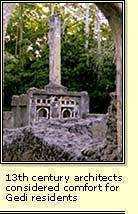
The Waswahili Community Trust UK
(Wadhamini wa jumuiya ya Waswahili)


|
The Waswahili Community Trust UK |

|
Good Community Relations Between Muslims and Non-Muslims
can bring about a real improvement in the unjustifiable image about Islam. But, also more fundamentally
to give Muslims the ability to influence Non-Muslim communities into accepting the message of Islam |
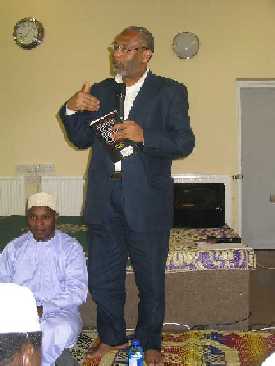
I am very pleased to have this opportunity to address today's celebration to mark the birthday of prophet Mohammad, peace and blessing be upon him (P.B.U.H.). This anniversary, however, provides us with the great opportunity to meet and share our experience and to consult each other, and exchanging ideas on wide-range of critical issues affecting our community in particular, and the wider world in general.
Furthermore, the importance of any religious congregation is being emphasised again and again in the several verses of the holy Quar'an. It is, therefore, within this spirit, we celebrate the most significant occasion in the annual calendar of Islam.
When I received your invitation to address today's congregation, I had a deep reflection on trying to find out the theme for my speech. I was also anticipating seeing some representatives from the non-Muslim communities. But, unfortunately, my expectation is being proved incorrect.
It is my strong belief that inviting some representatives from the non-Muslim communities to attend this celebration might provide an opportunity for a dialogue. On this particular occasion the subject of a dialogue might be on the importance of holding this kind of celebration, and gradually to cover some critical issues of common interest.
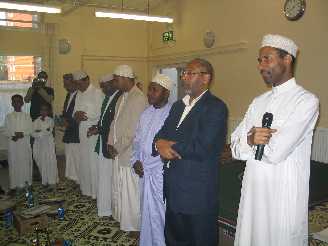
Hence, by engaging in good community relations, then we are going to be in a good position to remove the social barriers, and to show greater religious tolerance by building bridges with the non-Muslim communities. This process of establishing good community relations is the only means to enable us to propagate the message of Allah - God.
By adopting this process of rapprochement, we are going to do our most important duty of changing the prevailing bad perception on Islam in the West and beyond. It is also our obligation to reach out to people outside our community. This is simply because, Islam is not exclusively design for a particular section or nation or tribe.
The development of community relations is as important as family relations. Obviously, a good starting place must be within our own families. This, however, involved in giving our beloved wives their lawful rights, and treating them fairly, and equally and with great respect and humility. They should be consulted on family issues, and be part of the decision-making process on all family matters. As prophet Mohammad's (P.B.U.H.) life history shows that he was a devoted husband, and he was quoted saying:
Equally,as a father and grandfather he was a unique personality, and was always kind, responsible, faithful and affectionate. Also, Prophet Mohammad's (P.B.U.H.) relations with his neighbours, also showed that he had very good neighbourly relationship unknown in human history.
In other words, prophet Mohammad (P.B.U.H.) was a human like any other human being, but whose human attributes and human values were unique in human history. Hence he cannot be equated or be compared with any other person in terms of his humanity, and kindness, or his generosity, and above all, his immense spirituality and nearness to (Allah) God. As one speaker in his speech today, praising prophet Mohammad (P.B.U.H.) commented in the Swahili language:
Furthermore, in the history of Mankind, prophet Mohammad's (P.B.U.H.) history both before, and after his birth is being widely recorded, and widely read across the world. There is no concrete evidence of any kind to show, that there is any individual whose life history has arisen such an extraordinary interest and world attention, and whose record, is so widely maintained and so widely read like that of prophet Mohammad (P.B.U.H.). Even from the Persian civilisation, or Julius Caesar's era, to our modern time, there has been no bibliographical writing of any individual comparable with prophet Mohammad's database of information.
The main fundamental question to ask ourselves being that: What then, constitutes the moral goodness, or high standards of honesty and integrity on our part? Is it in the way we dress beautifully and elegantly, while at the same time, living the life of moral decay and degeneration?
It is regrettable and depressing to live in a such kind of life, despite the fact that Muslims are being endowed with an impressive and inspiring glorious reputation, and with great spiritual values of prophet Mohammad (P.B.U.H.) for which all Muslims cherish and emulate.
Another critical question now being, why we do not apply such qualities to our own advantage to establish the basis for rapprochement in reaching out the other communities, so that they may also enjoy and share with us the prophet's benefits? In this, therefore, I would like to make a special appeal to the organisation that next time, when organising any activities, I highly recommend inviting some representatives from the other communities.
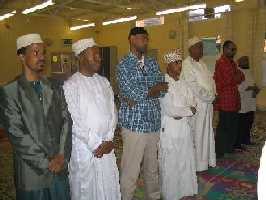
Islam, is a peaceful religion, hence the Arabic word Islam, meaning peace. In this sense, people were not being converted into Islam by force, but through a peaceful dialogue. In this way individual lives and societies had been transformed by the high ideal of Islamic faith.
It is also our belief that all the prophets who preceded prophet Mohammad (P.B.U.H.) were sent with a message of winning and guidance of their own particular communities. None of these messengers (prophets) were intended to be universal. Until the last messenger, prophet Mohammad, (P.B.U.H.) who was sent for the whole of humanity and posterity. This,therefore, is the main difference between prophet Mohammad (P.B.U.H.), and the other prophets who came before him.
Other prophets, also did not command majority support from their own communities. But, in the case of prophet Mohammad (P.B.U.H.), he is being supported en mass by many different communities. Hence, Islam spread with great rapidity across the world.
Now, I would like to turn to the critical issues of bringing up our children in the Western world. In this I would like to emphasise the point that we cannot bring our children or treat our wives, as said earler, in Europe in the same way; we used to treat them back in my hometown Siu (click for the Map of Uswahilini from the home page for Siu geographical location in Kenya.) We must try as much as possible, and with greater effort to broaden our horizon in order to cope with the different life environment in the West and beyond.
As regards the relations with our children, we have special obligation to give them equal treatment irrespective of their gender. This involved giving them good care and attention, and in treating them in a friendly and approachable manner. We should also try to share their childhood experience and be ready to learn from them. In other words, we have to develop an intimate and close personal relationship to help them in their education progress.
In schools, both parents should be involved in the day-to-day progress of their children's education. The responsibility should not be left to the mothers alone; fathers should also share such responsibility.In the same way, both parents should also participate in the running of their children's schools. By attending such meetings as the Parents Teachers Association (PTA). Taking part in the schools' educational activities, and helping the teachers in their main task of educating the children. The relationship between the schools and the parents should be that of partnership, where both sides are involved in making their contribution for the benefit of the children.
It is also worth mentioning that there are many British parents, who are for one reason, or another, did not have the opportunity to go to universities for higher education, but they do not see this as a barrier to deny their children such opportunity. However, they consider education as being a necessity for both rich and poor, whatever their past life experience. As they believe, quite rightly that without education, it is impossible to plan for the future destiny of their children.
Equally, on our part, there are some families who also, feel hampered psychologically to allow their children to go to Universities just because they also did not have such a chance to do so. It is worth pressing the point that in the best interest of our children's welfare, it is very important to break this negative cycle of traditional thinking by providing every means necessary to support their education.
Education may also be provided in our home environment by taking courses with the Open University and similar kinds of educational institutions. For example, George Bernard Shaw the world's most famous British philosopher was educated by his mother and his aunty. One day he was asked:
The other form of learning process is by tuning on radio and other news media. Reading newspapers and be acquainted with the current affairs is another form of learning outside the school's environment. For example, back in Mombasa, there are some people who are unable to read Swahili newspapers, like (Taifa Leo) translated "Today's Nation", and yet they will go ahead and buy it, and then requesting the children's help in such a courteous Swahili manners:
We are living in the Information Age, where knowledge and the accessibility in the information are very fundamental towards understanding the complexities and the sophistication of the modern society, and most importantly to come to grips with the globalisation. As the most common English expression reminds us:
On our part, therefore, it is also fine in being wonderful preachers, but one must also set good and practical example, as that which had been provided by prophet Mohammad, (P.B.U.H) In the first place, Muslims cannot discuss the potential benefits derived from Islam with the non-Muslim communities, if Muslims are ignorant of the Non-Muslims sociological make-up. Because, there are some sections amongst our community who are so ignorant, to stereotyped the Europeans as being the enemies of Islam.
Developing closer links between Muslims and non-Muslim communities is necessary towards eliminating the existing mistrust and suspicion, and to bring about a common understanding and an improvement in the inter-community relations. As the famous Swahili proverb reminds us:
In this the historical evidence also shows that the British scholars have displayed great interest and enthusiasm in trying to understand non-British cultures. For example, in 1630 Wm Laud was the bishop of London, and Chancellor of the University of Oxford, he founded an Arabic chair at the Oxford University, and invited the British Orientalist Edward Pococke to fill it on a permanent basis on the 10th of August 1636, and this historical continuity has been maintained ever since by the Oxford University.
Long before the official establishment of Arabic chair, learning Arabic language was compulsory for all students. Having Arabic knowledge was considered essential and the only medium towards understanding, such knowledge as science, mathematics, medicine, and most importantly the holy Quar'an. It is because of this important reason, that the world's most famous British philosopher John Locke amongst others were obliged to study Arabic language. Therefore, a conclusion may be drawn that learning Arabic language during that period, became as significant as learning Latin in the later years. In this sense, however, the British Orientalists have made an enormous and valuable contribution in understanding non-British cultures
Finally, I would like to pay a special tribute to the great Swahili scholar, the late Sheikh Said Omar Abdallah, also commonly known by the name of Mwinyi Baraka. He was amongst very few members from our community who had the opportunity to travel to Europe in the 1950s. His expert knowledge and experience about Britain in the 1950s and 1960s, has contributed most in the understanding of British society.
Sheikh Said Omar Abdallah, was highly respected and admired by many people. He was known to have treated all people equally irrespective of their age, race, nationality, creed, or gender. In turn, he became a popular figure. As a student at the London University and then moved on to the Oxford University, his rare scholarship and personal qualities made him a unique personality. He has shown a great passion and great commitment not only in learning and understanding about the British way of life, but above all, his enthusiasm and inspiration of greater intensity to propagate the word of God - Allah. Hence, some of the British who had converted into Islam in the 1950s and 1960s in England, did so, through the great effort of the late Sheikh Said Omar Abdallah.
As a result of his relationship and his experience with the British, he found that they have deep-cultural and historical roots permeating in every sphere of their life. And most importantly, by practicing Christianity, this makes them more compassionate and charitable people. He also expressed great admiration for the British commitment to the welfare state, including its universal free education. The British according to him are very hard working people, and highly preoccupied in searching for knowledge and technical innovation. In one of his recorded speeches about the British, he noted:
Ideally, therefore, Sheikh Said Omar Abdullah has established the basis upon which the future generation may build on and expanding his useful contribution and good work. Also, his excellent example of tolerance, and his appreciation on the significance of learning foreign cultures made him a unique individual member of our community. Thus he acquired the most effective communication skills, and the ability to influence non-Muslim communities into accepting the message of Islam. This indeed is a good example we should always try to emulate.
About, six months before Sheikh Omar Abdallah's death, I asked him the following question: What was the main problem facing the Muslim community worldwide? In this, he replied:
"Why taking trouble you people organising something unlawful," such expression are just meant to provoke and cause incitement. Within the Muslim community there is also Shia-Sunni problem. For example, it is not uncommon for some members of the Sunni sect to treat with contempt some of the Shia's religious rituals and vice versa.
The late Sheikh Omar Abdallah, once told me an interesting story of some distinguished Arab visitors from Hadhramout,(a region of S.Arabia) who were being taken for a tour at the Westminster Abbey by the Archbishop of Canterbury during the 1940s. The main intension for such a tour was to show how Christianity is being successful and flourishing across the world. During the tour the Archbishop paused for a moment and faced his guests saying:
"I would like to ask you a very simple question," to which the guests replied to go ahead, "What evidence the Muslims have to prove that Islam is truly Allah's religion?" One of the distinguished Arab guest promptly replied:
We appeal for your donation for our charity
Comments and suggestions to improve this website
Your suggestions or concerns about our services
Please send you contributions.
| Thank you Asanteni |
|---|
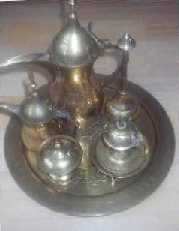
Copyright© March 2003: The Waswahili Community Trust (UK)
Registered Charity:1083065